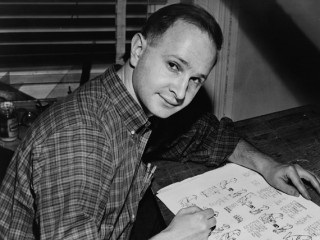
Jules Feiffer biography
Date of birth : 1929-01-26
Date of death : -
Birthplace : Bronx, New York, U.S.
Nationality : American
Category : Arts and Entertainment
Last modified : 2011-01-25
Credited as : Cartoonist and comic strip, playwright , The Village Voice
1 votes so far
Feiffer was educated at the Art Students League of New York and Pratt Institute in New York City, later assisting several comic-strip artists as he learned his trade. From 1949 to 1951 he drew “Clifford,” a Sunday cartoon-page feature. During the two years he served in the U.S. Army, he did cartoon animation for the Signal Corps.
In 1956 Feiffer's work was accepted by The Village Voice, a weekly newspaper published in Manhattan's Greenwich Village, where it was an immediate success and was syndicated, beginning in 1959.
Feiffer's first collection of cartoons, Sick, Sick, Sick (1958), was followed by Passionella, and Other Stories (1959). Passionella contains the character Munro, a four-year-old boy who was drafted into the army by mistake. Munro became the basis of an animated cartoon that received an Academy Award in 1961. Later cartoon collections include Boy, Girl, Boy, Girl (1961); Feiffer's Album (1963); The Unexpurgated Memoirs of Bernard Mergendeiler (1965); a retrospective, Jules Feiffer's America: From Eisenhower to Reagan (1982); Marriage Is an Invasion of Privacy (1984); and Feiffer's Children (1986).
Feiffer also wrote satirical revues, such as The Explainers (1961) and Hold Me! (1962), and a one-act play, Crawling Arnold (1961). His full-length plays— Little Murders (1967), The White House Murder Case (1970), and Grown Ups (1981)—like his cartoons, blend farce and biting social criticism. Other literary efforts include the novels Harry, the Rat with Women (1963) and Ackroyd (1977); The Great Comic Book Heroes (1965), which he edited and annotated; and several screenplays, among them Carnal Knowledge (1971), which was directed by Mike Nichols. In 1986 he received a Pulitzer Prize for editorial cartooning. Feiffer also worked on numerous children's books. In addition to illustrating the popular The Phantom Tollbooth (1961), written by Norton Juster, he wrote I Lost My Bear (1998), Bark, George (1999), The House Across the Street (2002), and A Room with a Zoo (2005).
















